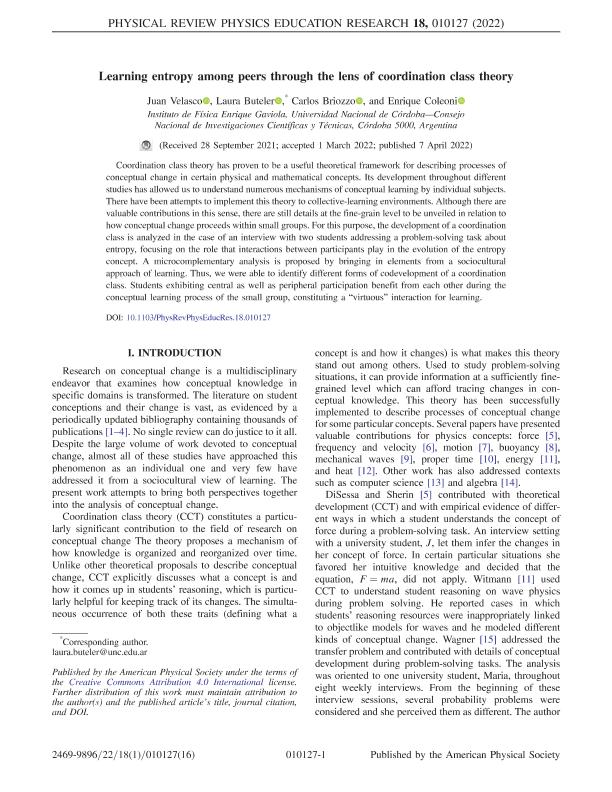Mostrar el registro sencillo del ítem
dc.contributor.author
Velasco, Juan José

dc.contributor.author
Buteler, Laura Maria

dc.contributor.author
Briozzo, Carlos Bruno

dc.contributor.author
Coleoni, Enrique Andres

dc.date.available
2023-08-08T16:41:12Z
dc.date.issued
2022-04-07
dc.identifier.citation
Velasco, Juan José; Buteler, Laura Maria; Briozzo, Carlos Bruno; Coleoni, Enrique Andres; Learning entropy among peers through the lens of coordination class theory; American Physical Society; Physical Review Physics Education Research; 18; 1; 07-4-2022; 1-16
dc.identifier.uri
http://hdl.handle.net/11336/207443
dc.description.abstract
Coordination Class Theory has proven to be a useful theoretical framework for describing processes of conceptual change in certain physical and mathematical concepts. Its development throughout different studies has allowed us to understand numerous mechanisms of conceptual learning by individual subjects. There have been attempts to implement this theory to collective-learning environments. Although there are valuable contributions in this sense, there are still details at the fine-grain level to be unveiled in relation to how conceptual change proceeds within small groups. For this purpose, the development of a coordination class is analyzed in the case of an interview with two students addressing a problem-solving task about entropy, focusing on the role that interactions between participants play in the evolution of the entropy concept. A micro-complementary analysis is proposed, by bringing in elements from a sociocultural approach of learning. Thus, we were able to identify different forms of co-development of a coordination class. Students exhibiting central as well as peripheral participation benefit from each other during the conceptual learning process of the small group, constituting a "virtuous" interaction for learning.
dc.format
application/pdf
dc.language.iso
eng
dc.publisher
American Physical Society
dc.rights
info:eu-repo/semantics/openAccess
dc.rights.uri
https://creativecommons.org/licenses/by-nc-sa/2.5/ar/
dc.subject
Learning
dc.subject
Entropy
dc.subject
Coordination Class Theory
dc.subject
Interaction
dc.subject.classification
Otras Ciencias de la Educación

dc.subject.classification
Ciencias de la Educación

dc.subject.classification
CIENCIAS SOCIALES

dc.title
Learning entropy among peers through the lens of coordination class theory
dc.type
info:eu-repo/semantics/article
dc.type
info:ar-repo/semantics/artículo
dc.type
info:eu-repo/semantics/publishedVersion
dc.date.updated
2023-07-07T21:33:42Z
dc.identifier.eissn
2469-9896
dc.journal.volume
18
dc.journal.number
1
dc.journal.pagination
1-16
dc.journal.pais
Estados Unidos

dc.description.fil
Fil: Velasco, Juan José. Universidad Nacional de Córdoba. Facultad de Matemática, Astronomía y Física; Argentina. Consejo Nacional de Investigaciones Científicas y Técnicas. Centro Científico Tecnológico Conicet - Córdoba. Instituto de Investigaciones en Físico-química de Córdoba. Universidad Nacional de Córdoba. Facultad de Ciencias Químicas. Instituto de Investigaciones en Físico-química de Córdoba; Argentina
dc.description.fil
Fil: Buteler, Laura Maria. Universidad Nacional de Córdoba. Facultad de Matemática, Astronomía y Física; Argentina. Consejo Nacional de Investigaciones Científicas y Técnicas. Centro Científico Tecnológico Conicet - Córdoba. Instituto de Física Enrique Gaviola. Universidad Nacional de Córdoba. Instituto de Física Enrique Gaviola; Argentina
dc.description.fil
Fil: Briozzo, Carlos Bruno. Universidad Nacional de Córdoba. Facultad de Matemática, Astronomía y Física; Argentina. Consejo Nacional de Investigaciones Científicas y Técnicas; Argentina
dc.description.fil
Fil: Coleoni, Enrique Andres. Consejo Nacional de Investigaciones Científicas y Técnicas. Centro Científico Tecnológico Conicet - Córdoba. Instituto de Física Enrique Gaviola. Universidad Nacional de Córdoba. Instituto de Física Enrique Gaviola; Argentina. Universidad Nacional de Córdoba. Facultad de Matemática, Astronomía y Física; Argentina
dc.journal.title
Physical Review Physics Education Research
dc.relation.alternativeid
info:eu-repo/semantics/altIdentifier/url/https://link.aps.org/doi/10.1103/PhysRevPhysEducRes.18.010127
dc.relation.alternativeid
info:eu-repo/semantics/altIdentifier/doi/http://dx.doi.org/10.1103/PhysRevPhysEducRes.18.010127
Archivos asociados
